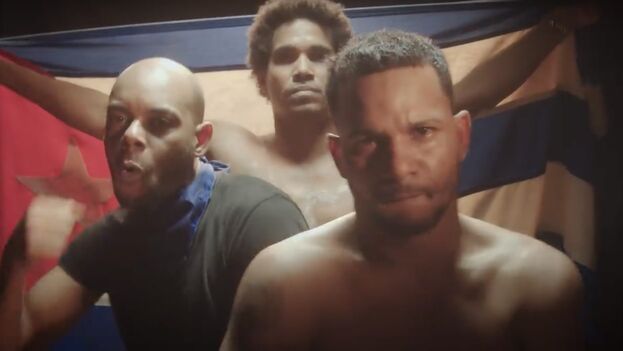
![]() 14ymedio, Havana, 17 February 2021 — The video was released on social networks on Tuesday night and just twelve hours later it already exceeded 200,000 views on YouTube. No one expected anything less: for the first time Gente de Zona, Yotuel Romero and Descemer Bueno, residents outside of Cuba, work in a collaboration with the musicians Maykel Castillo Osorbo and El Funky, on the island. Together, they turn the most necrophiliac motto of the Revolution and create a rebellious song: Patria y Vida (Homeland and Life).
14ymedio, Havana, 17 February 2021 — The video was released on social networks on Tuesday night and just twelve hours later it already exceeded 200,000 views on YouTube. No one expected anything less: for the first time Gente de Zona, Yotuel Romero and Descemer Bueno, residents outside of Cuba, work in a collaboration with the musicians Maykel Castillo Osorbo and El Funky, on the island. Together, they turn the most necrophiliac motto of the Revolution and create a rebellious song: Patria y Vida (Homeland and Life).
The theme is, mainly, a tribute to the San Isidro Movement (MSI) and the protests it has triggered.
The artist Luis Manuel Otero Alcántara, leader of the MSI, who appears with Osorbo in the video hugging a Cuban flag, declares to 14ymedio that the most important thing about “this action” is “to draw attention to society, the Blacks of the San Isidro neighborhood, the Blacks of the Cerro neighborhood, those who stand in endless lines.” In his opinion, the video clip “helps to create that project of a country where these people feel identified, included.”
“They broke down our door, violated our temple and the world is aware that the San Isidro Movement continues to be in place,” says one of the verses of the song, in reference to the eviction that MSI suffered on November 26, after more than one week on hunger strike for the imprisonment of rapper Denis Solís, which was the trigger for the peaceful protest on November 27 in front of the Ministry of Culture.
The audiovisual, directed by the Cuban director Asiel Babastro, collects several moments of the repression that Cuban artists have suffered in recent months, both in acts of repudiation and in arbitrary arrests. It also includes, for example, a fragment of the protest carried out on Calle San Rafael by Luis Robles, who today is serving prison for the crime of “acts against the security of the State.”
Note: The version of the video above is subtitled in English. The version below offers the options of choosing subtitles and seeing the lyrics in the original Spanish.
In addition, the theme denounces the precarious economic situation of the country. “What do we celebrate, if people are quickly exchanging Che Guevara and Martí for hard currency?” Sing the reggaeton players, alluding to the recent monetary reform and the creation by the Government of foreign currency stores to which most Cubans do not have access.
“No more lies, my people ask for freedom, no more doctrines. Let us no longer shout homeland or death but homeland and life,” Alexander Delgado, from Gente de Zona, is heard saying at another point in the song, which has raised a wave of support on the internet with the hashtag #PatriayVida.
In the live online presentation, the musicians sent a message of solidarity to the artist Luis Manuel Otero Alcántara, El Funky and Osorbo. They managed to establish contact with them, but very briefly because communication was cut off.
For Yotuel Romero, Patria y vida is “a song to freedom, a song to life, a song to love for our land, for our Cuba.”
“We cried making the song, making the video,” confesses Romero. “I want you to listen to the song, internalize it and say along with us: it’s over, the lie is over, the deception is over, the torture is over, the incarceration is over, the prison is over, not letting you be you is over.”
Descemer Bueno, for his part, claims to be “super happy to be making history” because for him this issue “marks a before and after” for the generations that follow. “People are already realizing what is happening and are feeling firsthand what the end of this dictatorship is going to be,” he predicts.
With a career full of successes in Cuba in the video clip universe, Asiel Babastro considers this work as “the icebreaker,”,by including artists censored in Cuba and having a rebellious discourse. The director said that it was a “tremendous responsibility” for him “to bring together these people who have been around the world.” The director also speaks of the importance of connecting “with the message of the song, with people who are doing real things to have the right to have rights.”
“I have always believed that a government that tells lies does not deserve to be there, I believe that the truth is for everyone, there is no need to go further, the video talks about that, it shows with the honesty of these artists, their speech, we want to have the right to think differently, to see a change,” he asserts.
The regime has not been long in replying to the viral video clip, in an article that, in line with the campaign carried out by the state media against the San Isidro Movement and the 27N, it tries to denigrate the authors of the song by calling them “moochers.”
____________
COLLABORATE WITH OUR WORK: The 14ymedio team is committed to practicing serious journalism that reflects Cuba’s reality in all its depth. Thank you for joining us on this long journey. We invite you to continue supporting us by becoming a member of 14ymedio now. Together we can continue transforming journalism in Cuba.
